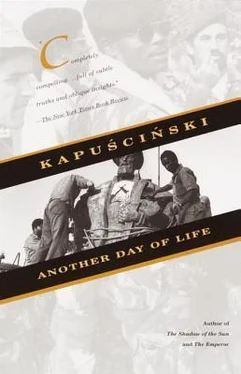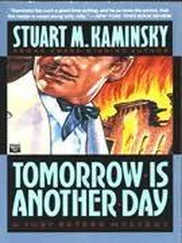The hotel grew crowded and noisy. Neto was supposed to proclaim the independence of Angola late Monday night, and an aircraft had brought umpteen foreign correspondents from Lisbon for the occasion. They were given visas and lodged in our hotel. Oscar was tearing his hair in desperation because there was nothing to give them to eat, but they cheered him up by saying that food wasn’t important. Information was important.
What stories the world press publishes! I read many of the dispatches sent from Luanda in those days. I admired the opulence of human fantasy. But I also understood my colleagues’ predicament. The editor sends a reporter to a country that is fascinating to the entire world. Such a journey costs a lot of money. The world is waiting for a great story, a scoop, a sensational narrative written under a hail of bullets. The special correspondent flies out to Luanda. He is taken to the hotel. He gets a room, shaves, and changes his shirt. He is ready and goes out immediately to look for the fighting.
After several hours he announces that he’s beating his head against a wall—
He can’t do anything.
Angola betrays no interest in his presence. The telephone doesn’t answer, or if it does it answers in Portuguese, a language he doesn’t understand. If he has enough strength and endurance, he can make the journey on foot to Government Palace. There he meets Elvira, a moon-faced typist who will smile but knows nothing and isn’t telling what she does know. He might meet young Costa, who will answer all questions by shaking his head and remaining silent. Make the trip to MPLA headquarters? That’s an all-day journey, and besides, the guard won’t let him through the gate. Go to President Neto! But how? Nobody will say where the President lives. Ride to the front. To what front? You can’t travel outside Luanda; it’s a closed city. A group of Frenchmen acquired a car somewhere and decided, without looking into anything, to drive to the northern front. They were stopped at the first checkpoint and delivered straight to the airport. See a Cuban! But how? They are nowhere to be seen. Is Luso in MPLA hands? Because Savimbi says that UNITA holds it. Who knows? There has been no contact with that city for a long time. It’s essential to find out exactly where the front is. Where the front is? Who could know that? Even at headquarters, nobody is sure.
There are some remaining sources of information: Dona Cartagina, Oscar, and Felix. Dona Cartagina is now busy cleaning and has no time for politics. In any case, she speaks only Portuguese and it’s hard to communicate with her. Oscar invariably repeats MPLA slogans: A vitória é certa! Victory is certain. But that is skimpy and, moreover, not exactly what everyone is looking for. Felix gives the most matter-of-fact and truthful answers. Asked about the situation, he answers tersely: Confusão.
Confusão is a good word, a synthesis word, an everything word. In Angola it has its own specific sense and is literally untranslatable. To simplify things: Confusão means confusion, a mess, a state of anarchy and disorder. Confusão is a situation created by people, but in the course of creating it they lose control and direction, becoming victims of confusão themselves. There is a sort of fatalism in confusão . A person wants to do something, but it all falls to pieces in his hands; he wants to set something in motion, but some power paralyzes him; he wants to create something, but he produces confusão . Everything crosses him; even with the best will in the world, he falls over and over again into confusão. Confusão can overwhelm our thinking, and then others will say that the person has confusão in his head. It can steal into our hearts, and then our girls dump us. It can explode in a crowd and sweep through a mass of people — then there is fighting, death, arson. Sometimes confusão takes a more benign form in which it assumes the character of desultory, chaotic, but bloodless haggling.
Confusão is a state of absolute disorientation. People who have found themselves on the inside of confusão can’t comprehend what is going on around them or in themselves. Nor can they explain specifically what caused this particular case of confusão . There are carriers who spread confusão, and others must beware, though this is difficult because literally any person can at any moment become a perpetrator of confusão, even against his will. By confusão we also understand our own states of perplexity and helplessness. We see confusão raging around us and can’t do anything to stop it. Camaradas, we hear again and again, don’t make confusão! —don’t! But does it depend on us? The most precise report from the front: What’s new with you? confusão! Everyone who understands this word knows the whole story. confusão can reign over an enormous territory and sweep through millions of people. Then there is a war. A state of confusão can’t be broken at one stroke or liquidated in the blinking of an eye. Anyone who tries falls into confusão himself. The best thing is to act slowly and wait. After a while confusão loses energy, weakens, vanishes. We emerge from a state of confusão exhausted, but somehow satisfied that we have managed to survive. We start gathering strength again for the next confusão.
How to explain all this to people who have been in Luanda only a few hours? So once again, as if they hadn’t heard him, they ask Felix:
“What’s the situation?”
And Felix answers:
“Haven’t I told you already? Confusão.”
They go away shaking their heads and shrugging their shoulders. And they are shaking their heads and shrugging their shoulders because Felix has sown confusão among them.
The next four days were drowned in unusual confusão . Every so often someone came into the hotel shouting, “They’re coming! They’re coming!” and announced breathlessly that the armored vehicles of the Afrikaners were already at the city’s edge. According to one, they were painted yellow; according to another, green. Numerous figures were given: Ten of these vehicles had been seen, later fifty or more. There was no way to check: They might really be a few kilometers away, or those might have been mere rumors. Oscar hung a map of Angola behind the reception desk. A crowd of people stood before it, arguing. Everyone wanted to show with his finger where in his opinion the front was, who had what city, to whom this or that road belonged. No two of them had the same picture of the situation. After a few days, the hundreds of fingers sweeping across the map had rubbed out cities, roads, and rivers. The country looked like a fragment of a gray, naked planet without people or nature.
On Monday the Portuguese garrison sailed away. The last platoon climbed the gangplank to the ship that morning. I knew some of the officers there and I went to say good-bye to them. The locals wanted the garrison to leave as quickly as possible. After years of colonial war, there could be neither understanding nor friendship between the two sides. But I saw it differently. I knew that in this final period the Angolans owed a large debt of gratitude to many, though not all, of the Portuguese officers. They had known how to behave loyally. I myself owed them a lot. They had treated me with sympathy and helped me generously. Nor had they ever attacked the Cubans, although the first people from Havana had come here when Angola was still formally a part of Portuguese territory. There exists a kind of interpersonal solidarity that should not be destroyed by dry political calculation.
Читать дальше











